I'm excited to help promote another awesome newsletter, The Premoney List, a newsletter that shares 10 pre-money companies each week. Partnership powered by Swapstack.
I was listening to one of my favourite podcasts Acquired and heard them break down the story behind Harpo Studios, which was the production company set up by Oprah Winfrey in 1986.
The episode blew my mind…
I had always known Oprah as this lovable public figure and talk show host, but I didn’t realise the extent of her business accomplishments. They are monumental. They are genius. I was actually embarrassed that I didn’t know Oprah as this business titan.
Looking through a modern lens, I also realised that Oprah is basically the most successful influencer of the last thirty years.
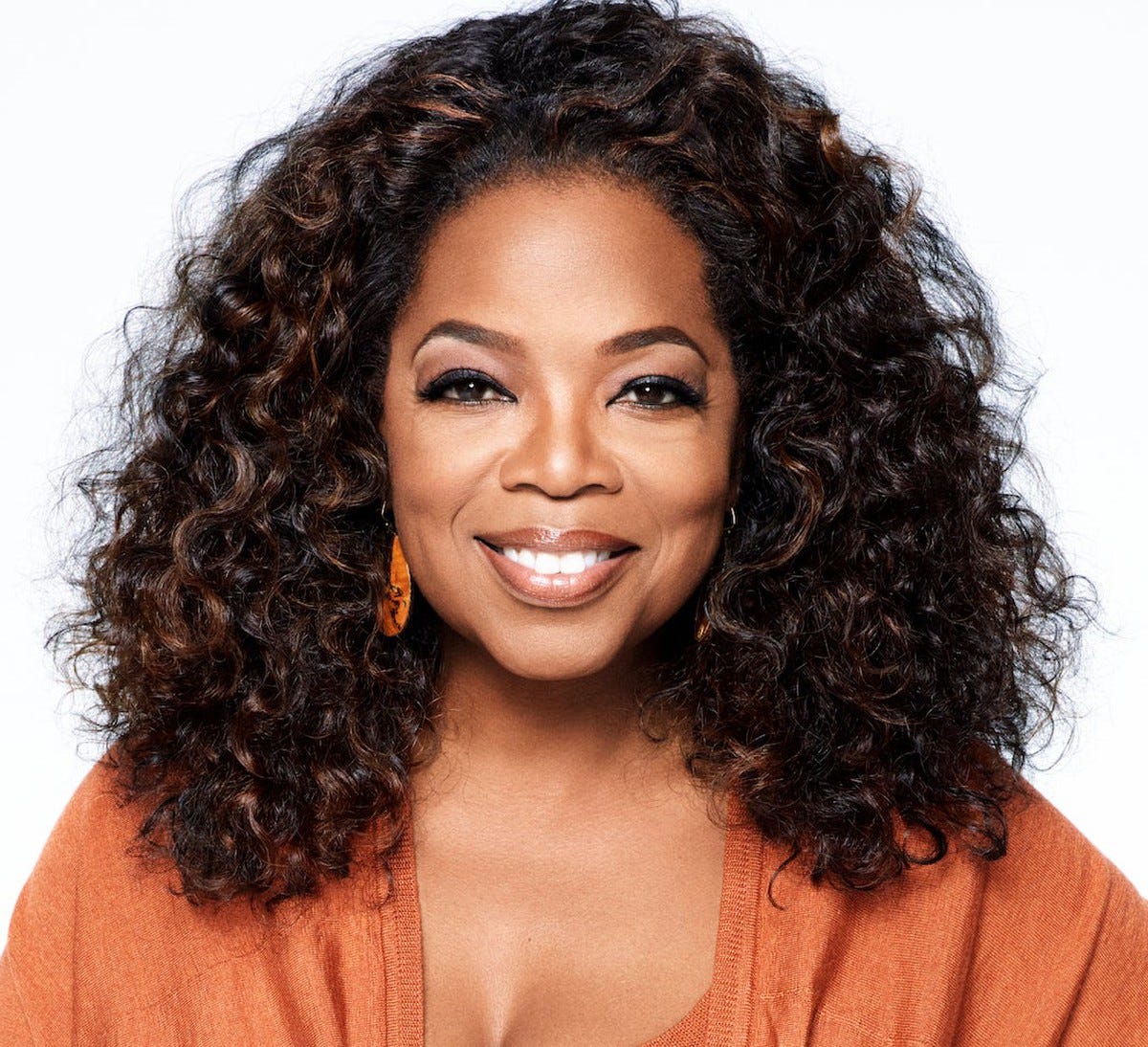
But first, an O-verview:
I feel compelled to say that Oprah Winfrey is one of the most impressive human success stories of the twentieth century.
Her early years were pretty tragic, as she grew up in poverty, was a victim of sexual abuse, got pregnant at 14 and lost her son, who was born prematurely. She eventually became the youngest news anchor and first black female news anchor on Nashville’s WLAC-TV.
The Oprah Winfrey show debuted in 1986 and very quickly became the number one daytime talk show in America.

She is the richest self-made female billionaire in America and the richest African-American of the twentieth century.
But if you look at the way she approached business, she fulfilled the ideals of what an ‘influencer’ should be.
Oprah Owned the Customer Relationship Through Her Own Brands
Probably the single most consequential decision of Oprah’s business career was to set up her own production company Harpo Studios. By founding Harpo, she became the first black person and third woman to own a major production studio.
Oprah wasn’t content to be just an anchor paid by her TV network. She endeavored to create her own network. Her own books. Her own website. Her own radio channel. Her own magazine.
These were all product extensions that didn’t rely on any brand other than her own. They seem like obvious decisions now, but Oprah was building this in a time period where people expected different things from celebrities.
Traditionally, the playbook for a media personality (especially in the 80s when Oprah got started) was to lend their image and endorse a major consumer brand rather than build their own. It would have been more obvious for Oprah to become a L’Oreal ambassador or appear in commercials for a fashion brand.
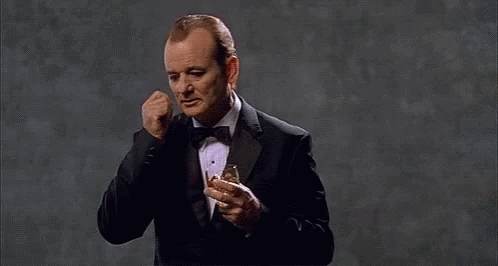
This still happens, but the most successful media personalities don’t just rely on intermediary brand sponsorships. They create their own brands and this usually ends up with better financial rewards:
Kanye West became a billionaire from owning his own Yeezy brand. Prior to Yeezy, Kanye had a partnership with Nike where the brand still maintained high levels of control and ownership. Kanye left Nike to partner with Adidas, who gave Kanye more creative control and royalties. Kanye has retained 100% ownership of the Yeezy brand.
George Clooney founded Casamigos Tequila in 2013, then sold it to Diageo for $1 Billion in 2017. His most famous brand partnership was with Nespresso, but he has made significantly more money by starting his own Tequila brand.
Each of these examples were conscious decisions and it’s more common to see this from modern day influencers.
Kylie Jenner became a billionaire (or close to one) from owning Kylie Cosmetics. She has several income streams, including sponsoring companies like Puma and Fashion Nova, but the vast majority of her net worth came from her own brand.
TikToker Addison Rae just launched her own beauty brand Item, rather than relying on endorsing major cosmetic brands.
Jeffree Star, one of the world’s biggest YouTube beauty influencers, has his own cosmetic brand. This allows him to succeed even after getting dropped by makeup retailers like Morphe.
The most successful ways people leverage their brands today involve creating their own products. Oprah demonstrates that she even knew this in the 1980s, way before this was an obvious path.
The Oprah Bump - Oprah Did Brand Partnerships Well
When Oprah did decide to partner with brands, she did it really well.
Because fans trusted Oprah’s opinion, they would regularly buy the products she recommended. A term called the ‘Oprah Bump’ was developed to describe the boost in sales that brands would experience once endorsed by Oprah.
Oprah would periodically publish a list called Oprah’s Favourite Things. The list would come out during the holiday season and be the products Oprah would recommend as gifts. She featured everything from cosmetics to snacks to books to apparel—created by companies ranging from small businesses to big brands.
For a brand to be featured on Oprah’s Favourite Things, especially as a small brand, this could mean a huge, life-changing boost in sales.
That should be a major business goal of every influencer - to prove that the right partnership with them will actually cause a bump in sales.
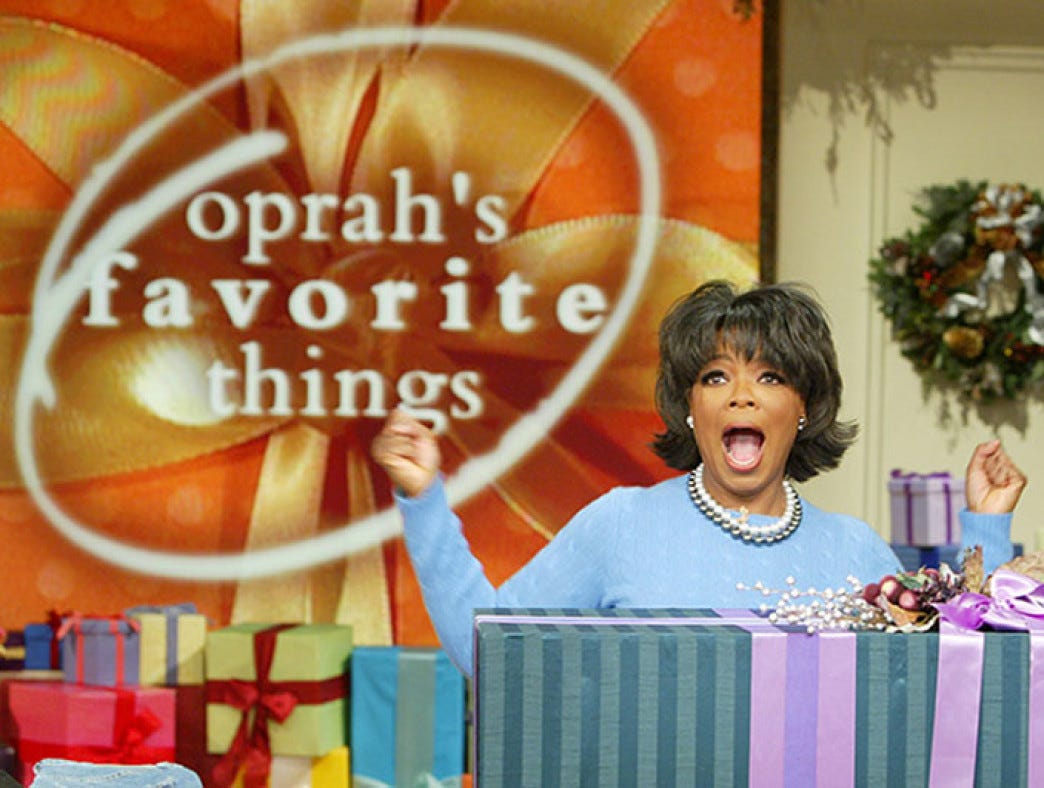
Oprah also created Oprah’s Book Club, a specific book that she picked around once a month. She would invite the author to be interviewed on her show and in almost every situation, Oprah was significantly more famous than the author whose book she was promoting.
Whenever they came onto the Oprah Winfrey show, each author was able to leverage Oprah’s massive platform to build their own brand. And for Oprah, this process was repeatable, scalable, and positively impacted her brand as well.
After hosting her book club for years, Oprah now has a group of famous authors who are likely Oprah brand evangelists. They can all look back to her Book Club as one of the biggest moments of their career.
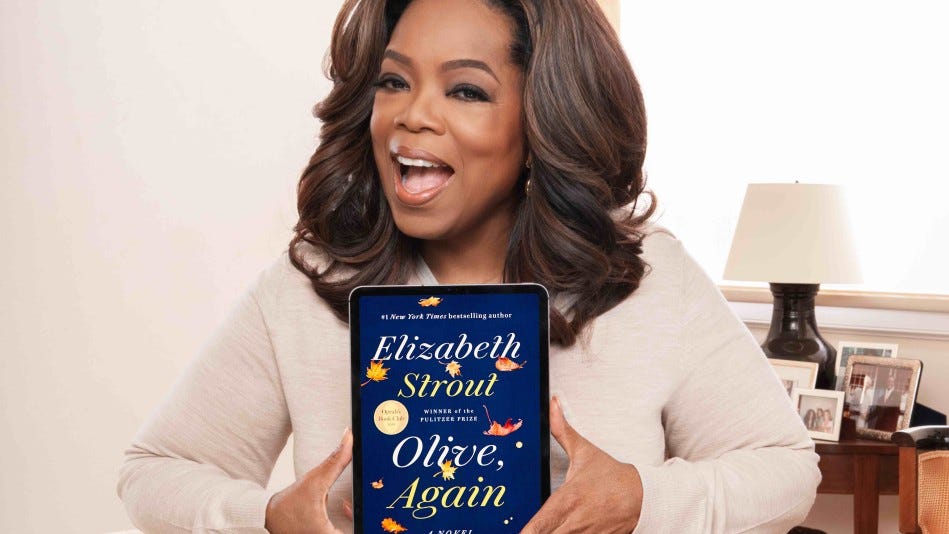
And Oprah worked with huge brands as well.
One of Oprah’s most famous shows was when she gave away 276 cars to her studio audience. What most people don’t know is that the cars were provided by General Motors and cost the company about $8 Million.
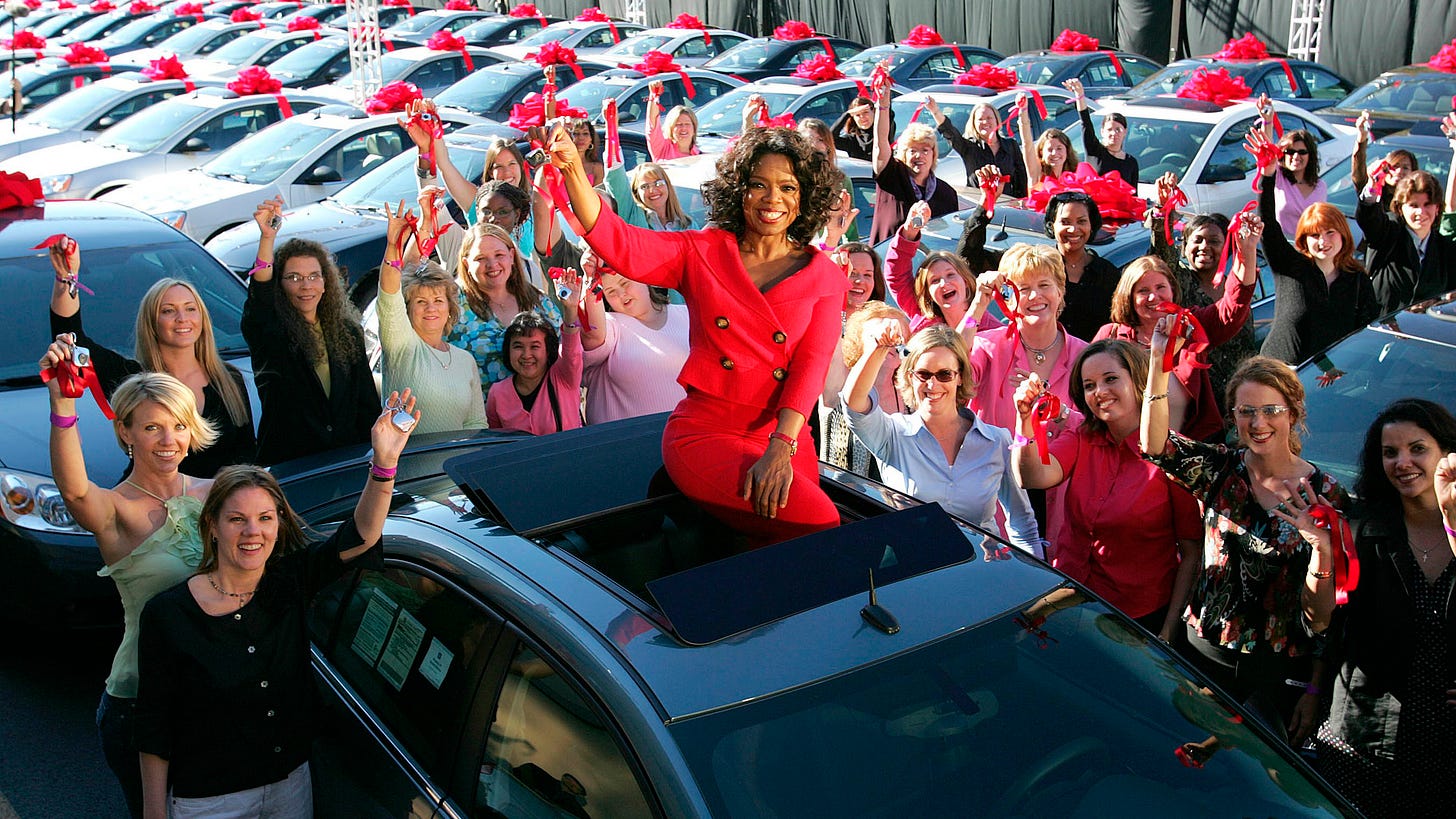
General Motors saw the massive potential reach in having a partnership with Oprah Winfrey that they were willing to spend $8 Million dollars because they believed that working with her would yield positive ROI for their investment.
From working with small brands to huge multinational companies, Oprah was able to create mutually beneficial partnerships that drove results.
Oprah’s Secret Ingredient…Extreme Authenticity
Oprah is known for being incredibly raw and authentic. She openly talked about her struggles with weight. She told stories about her experiences with abuse and racism, and her interviews with guests also went deep.
One of the most endearing things about Oprah is the fact that she’s so authentic. But this isn’t just some cheesy marketing term.
From a business perspective, what’s the true benefit of authenticity? Trust.
People trust Oprah and people make purchase decisions based on that trust. That’s why Oprah’s Book Club picks and Oprah’s Favourite Things and Oprah’s own products did really well.
The former LinkedIn CEO Jeff Weiner once said “Trust equals consistency over time.”
The Oprah Winfrey show ran for 4,561 episodes across twenty five seasons from 1986 to 2011. If you imagine the cumulative number of hours people have spent watching Oprah and listening to her voice, that creates a very strong connection for a fan.
Look at the entrepreneur, author and speaker Gary Vaynerchuk. In many ways, he is a modern version of Oprah, but a little more rough around the edges. He swears; he’s abrasive; and he might come across as an asshole sometimes. One thing is for sure though—he’s not faking it. That is his true, authentic self.

Tim Ferriss, another ‘modern Oprah,’ has openly shared difficult stories from his life. He once wrote a blog post about his own struggles with suicide, and has said this post was actually one of his highest performing posts in terms of readership. One of his latest podcast episodes this month was talking about his experience of sexual abuse as a young child.
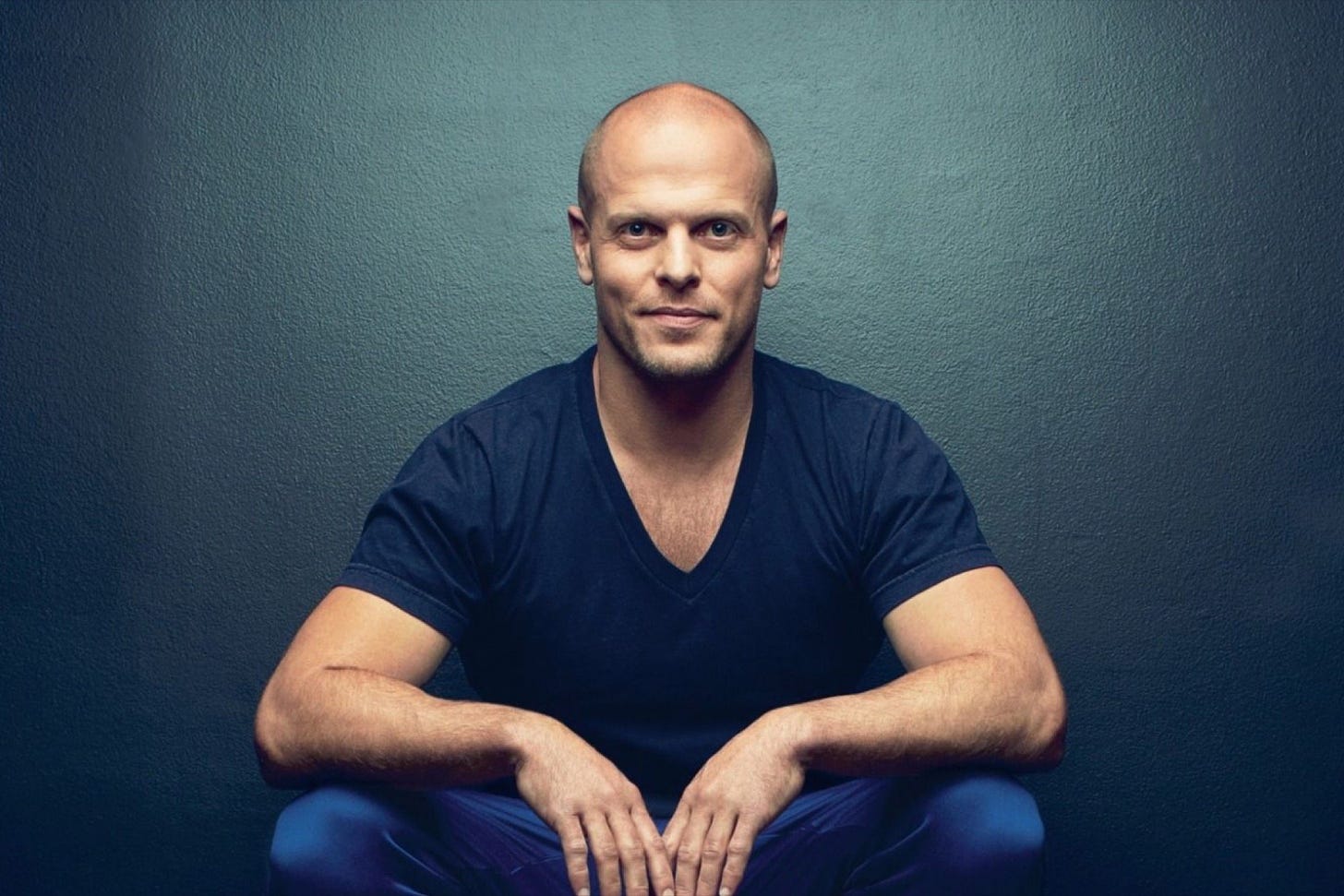
Sharing your own vulnerability is authentic and leads to trust.
The poet Maya Angelou once said, “I've learned that people will forget what you said, people will forget what you did, but people will never forget how you made them feel.”
The strongest way to make someone feel something is by sharing something about yourself that is vulnerable, deep, and authentic.
The people we look up to the most are experts in doing this—like Oprah.
Oprah’s Legacy
I see modern versions of Oprah’s blueprint in her proteges like Dr. Phil, Dr. Oz, and Rachel Ray.
I see modern versions of Oprah’s Favourite Things List in Tim Ferriss’s Five Bullet Friday.
I see modern versions of Oprah’s Car Giveaway in famous giveaways from YouTubers like Mr. Beast or David Dobrik.
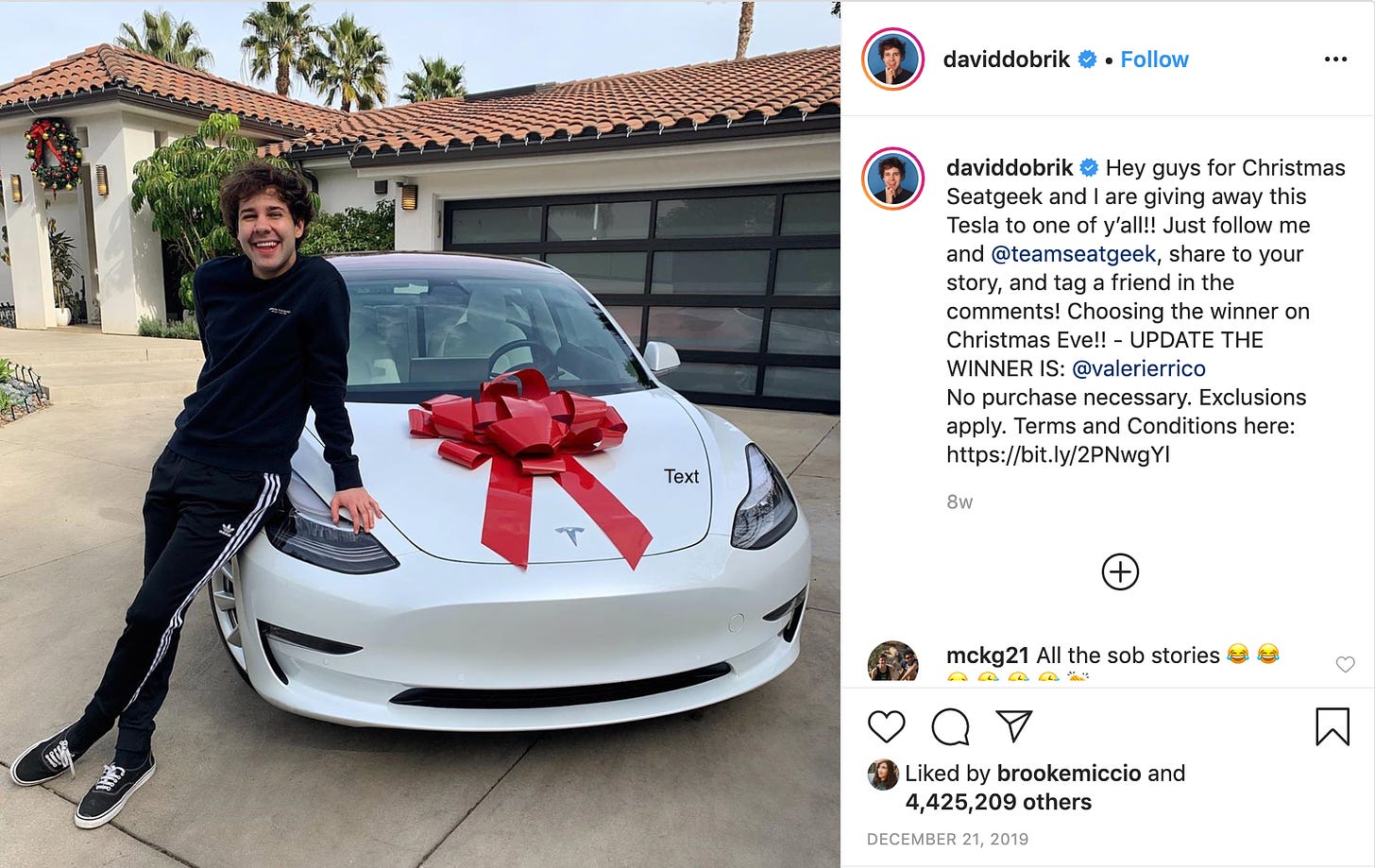
What can we learn from Oprah? How to be a great influencer.
But really, putting aside the ‘influencer’ buzzword, Oprah can teach us what it means to do successful brand marketing.
Oprah’s brand has been built consistently over time, which has always been supercharged by her level of extreme authenticity.
The brand equity she built allowed her to work with both major corporations (e.g. with General Motors for the car giveaway) and also startup brands (e.g. up and coming authors on Oprah’s Book Club).
And finally, this all allowed Oprah to take control of her business destiny by building products around her own brand and more importantly, by ‘owning’ the relationship with her fanbase deeply.
Oprah made people trust her. And she’s done that better than almost anyone else in the world. And she has created a billion dollar company off the back of that.
In my opinion, that makes Oprah the most underrated entrepreneur of the 20th Century and the greatest ‘influencer’ of the last thirty years.






How Oprah Winfrey Created the Influencer Playbook